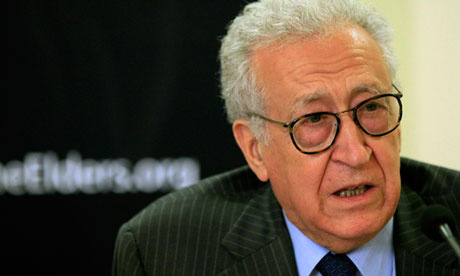Why Brahimi’s Mission Should Be Supported

Last Friday, the UN Secretary General introduced Lakhdar Brahimi, the former Algerian foreign minister, as his special envoy to Syria. Brahimi, substituting Kofi Annan, will be the UN and Arab League’s, and in other words, the international community’s envoy regarding Syrian affairs.
Brahimi, besides being a foreign minister, has played an effective role, as a senior official of the Arab League, in ending the conflicts and forming a new structure in Lebanon. He has been the UN representative in Afghanistan for two terms, which led to the formation of the new structure in this country. He also was the UN representative in Iraq, Haiti, and South Africa.
The selection of Brahimi, under the present conditions of Syria and the region, and while the mission of UN peacekeepers has ended in Syria and with the suspension of membership of this country in the Arab League and OIC, due to pressure and intervention of regional Arab powers, has interesting messages.
1. The nature of the UN and the Arab League appointing another representative is, in fact, indicative of following political solutions and preventing war. Despite present difficulties, this issue should be considered as a positive step and opportunity.
2. Brahimi's record, in comparison with Annan's, shows that he has more pragmatic experiences and especially, due to his past efforts, better knows the region.
3. When Brahimi was the Arab League’s representative on Lebanon, he used to work with the Assad dynasty. This means that he knows the nature of politics in the region and is well aware of the continuity and complexity of issues in the region.
4. The position taken by Brahimi, saying that it is still early to say whether Bashar should leave office, shows that he does not want to enter this crisis with a prepared prescription. Moreover, Brahimi has shown in different missions that he differentiates between the position of the UN and the interests of big powers.
5. It seems that Brahimi is well aware of current sensitivities in the region, particularly the disturbing issue of ethnic conflicts. His first public reaction regarding opposing views in Syria is a response to those individuals who accuse him of ethnic tendencies.
6. Brahimi’s record in Afghanistan clearly shows that he understands the role of regional powers and their ability to affect resolving crises and that he is capable of creating the necessary balance between international and regional powers to alleviate crises.
7. One should consider Brahimi’s selection as the last chance for diplomatic and political efforts to resolve the Syrian crisis and Brahimi’s defeat will be tantamount to being prepared for intervention of foreign powers in this crisis which of course is desirable for extremist factions in America and the region.
Although the possibility of a complete judgment on the work of Brahimi is a bit difficult under the current circumstances, when we consider the general resultant of Syrian developments and Brahimi’s personal characteristics and record, it seems that his selection should be considered as an opportunity to alleviate the suffering of Syrian people and that his efforts to put this country’s developments within the framework of political solutions and to achieve consensus and national reconciliation should be supported.

